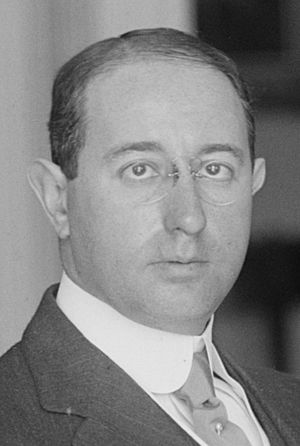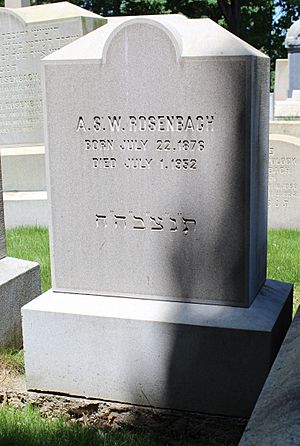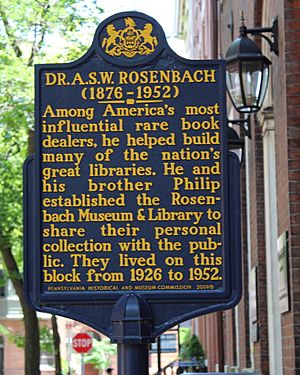A. S. W. Rosenbach facts for kids
Quick facts for kids
Abraham Simon Wolf Rosenbach
|
|
|---|---|
 |
|
| Born | July 22, 1876 Philadelphia, Pennsylvania
|
| Died | July 1, 1952 (aged 75) Philadelphia, Pennsylvania
|
| Resting place | Mount Sinai Cemetery |
| Nationality | American |
| Education | University of Pennsylvania (B.S) 1898 (Ph.D.) 1901 |
| Occupation | Antiquarian bookseller |
| Family | Moses Polock (uncle) |
Abraham Simon Wolf Rosenbach (July 22, 1876 – July 1, 1952) was a famous American collector, expert, and seller of very old and rare books and handwritten papers. People called him "Dr. R." or "the Greatest Bookdealer in the World."
In London, where he often went to auctions at Sotheby's, he was known as "The Terror of the Auction Room." In Paris, they called him “Le Napoléon des Livres,” which means “The Napoleon of Books.”
Rosenbach helped make collecting American literature popular. Before him, most people only collected books from Europe. He also showed that collecting rare books could be a good way to invest money. He wrote articles and books to get more people interested in rare books.
He bought and sold many amazing items. These included eight Gutenberg Bibles, over 30 copies of Shakespeare's First Folio, a copy of the Bay Psalm Book, and the original handwritten versions of Ulysses and Alice's Adventures in Wonderland. All the items he bought in his life would be worth more than $75,000,000 today.
Rosenbach also gave back to the community. He donated his collection of children's books to the Free Library of Philadelphia. He also started a special program at the University of Pennsylvania for studying books. When he passed away, he left his estate to the Rosenbach Foundation, which created the Rosenbach Museum & Library.
Contents
Early Life and Education
Abraham Simon Wolf Rosenbach was born on July 22, 1876, in Philadelphia, Pennsylvania. Many people called him "Abe." His close friends called him "Rosy," and his family called him "Abie." He was the youngest of eight children. His parents were Morris Rosenbach and Isabella H. Polock.
His mother, Isabella, was very active in the Jewish community in Philadelphia. His father, Morris, came to the United States in 1844. He started a shirt business and became a U.S. Citizen in 1855.
When Rosenbach was 9, he started helping his uncle, Moses Polock, in his shop. Moses Polock was a well-known seller of old and rare books. His famous shop was in Philadelphia. There, young Rosenbach learned how to figure out how much books were worth. He also learned how to talk to people who collected books.
At age 11, Rosenbach started his own book collection. He bought an illustrated book called Reynard the Fox at an auction. The auction house let him pay for the book in small weekly payments.
Rosenbach finished school in June 1889. He then went to Central Manual Training School. In his last year, he was the editor of the school newspaper, The Argus.
While he was a freshman at the University of Pennsylvania, Rosenbach made his first really valuable purchase. He bought a rare first edition of Dr. Samuel Johnson's Prologue. This book was the first one printed by Horace Walpole at the Strawberry Hill Press. Rosenbach bought it for only $3.60. Later, someone offered him $5,000 for it, but he said no!
At the University of Pennsylvania, Rosenbach was part of the Bibliophiles Club. In 1898, he earned his science degree. He then continued his studies and earned his PhD in 1901. His PhD paper was about how Spanish literature influenced plays in England long ago.
A Career in Rare Books
Philip Hyman Rosenbach was Abraham's oldest brother. Philip had run several successful businesses before joining his younger brother. In 1903, Philip convinced his uncle, mother, and Abraham to use Moses Polock's book collection to start a new business.
This new business was called The Rosenbach Company. It started on June 22, 1903. Abraham was in charge of the books, and Philip handled antique furniture and art. The company was first supported by collectors Clarence S. Bement and Joseph M. Fox.
In 1927, Rosenbach wrote about why he decided to sell books instead of staying in school. He said:
"I felt like I had left my old path. I had left the world of learning for a bookshop. I had given up my studies to start a business that might make me money. When I was in college, I didn't realize what a big adventure this business would be. I didn't know about the excitement and worry of the hunt. I also didn't know I would have a better chance to find old, unpublished papers and original materials than I ever would as a teacher at a university."
—A.S.W. Rosenbach, Books and Bidders: The Adventures of a Bibliophile (1927) page 260.
When Moses Polock passed away, his book collection was sold at auction. The Rosenbach brothers were able to buy most of it. This included Polock's collection of children's books, which had 816 American children's books from 1682 to 1836. Rosenbach added to this collection over the years. In 1947, he gave it to the Free Library of Philadelphia. This gift started the library's collection of early American children's books.
The Rosenbach Company first operated from Philip's old gift shop. Later, it expanded to another building.
Rosenbach worked with famous collectors like Henry E. Huntington and Henry Clay Folger. He helped them build their amazing libraries, such as the Huntington Library in California and the Folger Shakespeare Library in Washington, D.C. Other important clients included J. P. Morgan and Harry Elkins Widener.
In 1924, Rosenbach bought the original handwritten manuscript of James Joyce's Ulysses for $1,975. Joyce wanted to buy it back, but Rosenbach said no. James Joyce even wrote a funny poem about Rosenbach buying the book.
Rosenbach lived in Philadelphia his whole life. From 1926 to 1952, he and his brother lived in a four-story townhouse. In 1928, Rosenbach bought the original manuscript of Lewis Carroll's Alice's Adventures in Wonderland at an auction for $77,000. Many people in Great Britain were upset that this important item left their country. Rosenbach later sold it, and it eventually returned to Britain.
Rosenbach was chosen to be a member of important societies. He wrote papers for the American Antiquarian Society. These papers were about the libraries of U.S. Presidents and the first theater company in America.
In 1938, Rosenbach held a rare book auction in New York City for charity. It raised $35,000 to help Jewish war sufferers and Christian refugees. Famous people like Christopher Morley helped as auctioneers.
In 1942, the two brothers decided to sell their antique furniture. They wanted to focus only on books. They moved their smaller collection to a new building in Philadelphia.
In 1947, Rosenbach set a record when he bought a copy of the Bay Psalm Book for $151,000. It is estimated that he spent over $75 million on his purchases during his lifetime.
Writing and Publications
Rosenbach wrote many articles about his experiences and stories as a rare book dealer. These essays were first published in magazines like The Saturday Evening Post and The Atlantic. Later, they were put into two books: Books and Bidders: The Adventures of a Bibliophile (1927) and A Book Hunter's Holiday: Adventures with Books and Manuscripts (1936). He also wrote for The Jewish Encyclopedia.
The Unpublishable Memoirs (1917) was the only fiction book Rosenbach ever wrote. It has 11 mystery stories about a character named Robert Hooker. Hooker is a book lover who feels left out by rich society. He gets his revenge by tricking wealthy people out of their rare books and art.
Rosenbach also created several book lists. One important one was Early American Children’s Books (1933), which became a standard guide.
Honors and Awards
Rosenbach received many honors during his life. In 1927, he received an honorary degree from the University of Pennsylvania. In 1945, the Jewish Theological Seminary of America gave him a Doctor of Humane Letters degree. He received more honorary degrees from other colleges in 1947.
In 1946, thirty of Rosenbach's friends created a special book for his 70th birthday. It was called To Dr. R and featured essays about literature and books.
At the time of his death in 1952, he was also the Harbor-master for the state of New Jersey.
Death and Legacy
Rosenbach passed away on July 1, 1952, in Philadelphia. He was 75 years old. He was buried at Mount Sinai Cemetery.
The writer Christopher Morley wrote about Rosenbach in an essay. He said:
"He is the Pied Piper of rare editions. He blows an airy wheedling note and the old vellums and calfskins come trotting after him."
—Christopher Morley, Saturday Review
The Rosenbach Museum & Library
Before he died, Rosenbach left his estate to The Philip H. and A. S. W. Rosenbach Foundation. He and his brother had started this foundation in 1950. Their goal was to encourage interest in books, paintings, and other art.
In 1954, the Rosenbach Museum & Library was officially opened. It was created from the collection of the Rosenbach brothers. The museum includes their original libraries and living areas. Visitors can explore their collections of rare books, manuscripts, furniture, and art.
Some famous items in the collection include the only surviving copy of Benjamin Franklin’s first Poor Richard's Almanack. It also has the original handwritten manuscript of James Joyce's Ulysses. The museum's collection has grown to include the papers of poet Marianne Moore. It also has Bram Stoker's notes for Dracula and drawings by Maurice Sendak.
The Rosenbach brothers’ 1865 townhouse is listed on the National Register of Historic Places. In 2003, the nearby Maurice Sendak Building was added to the museum. It offers spaces for public programs and exhibitions. In 2013, the Rosenbach Museum & Library joined with the Free Library of Philadelphia. It is now known as "The Rosenbach at the Free Library."
State Historical Marker
On April 2, 2008, the Rosenbach Museum & Library received an official State Historical Marker. This marker was given by the Pennsylvania Historical and Museum Commission. It recognized Dr. A.S.W. Rosenbach's lasting contributions.
The marker honors Rosenbach as one of America's greatest rare book dealers. It also notes his contributions to Philadelphia and beyond. The marker is in front of the museum in Philadelphia. It reads:
"Dr. A.S.W. Rosenbach (1876 – 1952) Among America’s most influential rare book dealers, he helped build many of the nation’s great libraries. He and his brother Philip established the Rosenbach Museum & Library to share their personal collection with the public. They lived on this block from 1926 to 1952."
Lecture Series
In 1928, Rosenbach gave money to the University of Pennsylvania. This gift was to start a lecture series about books and their history. Special speakers give about three lectures over two weeks at the university.
The first Rosenbach Fellowship in Bibliography happened in 1931. Christopher Morley was the first speaker. As of 2019, it is the longest-running series of book-related lectures in the U.S. The University of Pennsylvania Press has published many of these lectures as books.
Musical Show
In 2004, The Rosenbach Museum and Library asked writer Ben Katchor to create something for the museum's 50th anniversary. Instead of a graphic novel, Katchor worked with Mark Mulcahy to create a musical.
The Rosenbach Company: A Tragicomedy first showed at the 2004 Philadelphia Fringe Festival. It was also performed in New York City in 2006. Mark Mulcahy played the role of Abie Rosenbach.
A reviewer named Toby Zinman praised the show in 2004. She wrote:
"Whatever this show is — a sung-through biodrama? a chamber rock opera? a meeting of the museum establishment with the music underground? — it is thrilling, charming and altogether a knockout."
—Toby Zinman, Variety
See also
 In Spanish: A. S. W. Rosenbach para niños
In Spanish: A. S. W. Rosenbach para niños



